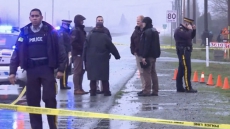The two richest Canadians have the same amount of wealth as the poorest 30 per cent of the country combined, according to a new report from a group of international aid organizations.
The Oxfam report says the wealth of billionaire businessmen David Thomson and Galen Weston Sr. equals that of about 11 million Canadians.
The group of organizations, under the banner group Oxfam International, published its report "An Economy for the 99%" ahead of the World Economic Forum in Davos, Switzerland, which begins Tuesday. The report also said that the world's eight richest people have as much wealth as the poorest 50 per cent of the world's population.
"This is not a report about the rich and the poor. It's about the super-rich and the rest of us," said Lauren Ravon, the director of policy and campaigns at Oxfam Canada.
Oxfam made its calculations about global wealth distribution based on the Credit Suisse Global Wealth Data book, and calculated the wealth of the world's richest people using the annual billionaires list from Forbes Magazine, which was last published in March 2016.
Jim Davies, a professor at the University of Western Ontario who works on the Credit Suisse report, said there can be broader implications of wealth inequality. He noted that those implications are often different from those of income inequality.
Wealth is calculated by subtracting a person's debts from their assets, he said, whereas income refers to the money or assets a person makes or receives over a period of time.
Wealth offers security, Davies said, which income doesn't always do.
"If you lose your job, you're in a much worse position if you don't have money in the bank," he noted.
Ravon said the effects of wealth inequality can ricochet into other parts of society.
"In countries that are more unequal, there's higher rates of crime. Those societies are less healthy. People distrust each other more," she said. "People feel like they're disconnected from society when they see that the super-rich are writing the rules in their favour."
And Stephen Harris, a professor of public policy at Carleton University and the University of Ottawa, said wealthy business owners have more power to lobby the government than the majority of everyday Canadians, which contributes to inequality.
"We used to really be a caring-sharing society," he said. "We lost some of that."
A society with so much inequality isn't economically sustainable, Ravon added. "In the long-term, if there's such concentration of wealth in the hands of just a few, there will be no one left to buy the goods, to keep the economy running."
But Harris said the problem isn't so easily fixed.
"I guess if I had a solution I'd be rich," he said. "But I don't have a bullet that would fix it."
He said there are some things Canada can do to address the problem — such as policies for wealth redistribution used in Nordic countries, which tend to have less inequality — but they won't work unless the population gets behind the changes.
"We can't just migrate a system to this country," he said. "People have to be supportive of it if it's going to have legitimacy."
Oxfam's report made a number of suggestions for the government to implement in its next federal budget, including progressive taxation — a system used in Nordic countries, where those with higher incomes pay a greater portion of that income in taxes.
It also suggested raising the proportion of government spending on public services and social protection.
For the government's part, an official in the office of Social Development Minister Jean-Yves Duclos said in a statement that Trudeau's Liberals have already started making changes to grow the middle class.
Mathieu Filion wrote in an email that one of the first things the government did after coming to power was to cut taxes to the middle class and raise them for families with an income of $250,000 or more. He also noted the government introduced the Canada Child Benefit, which he said gives an average of $2,300 to 90 per cent of families.
He said the government is watching the issue of wealth inequality "closely."




